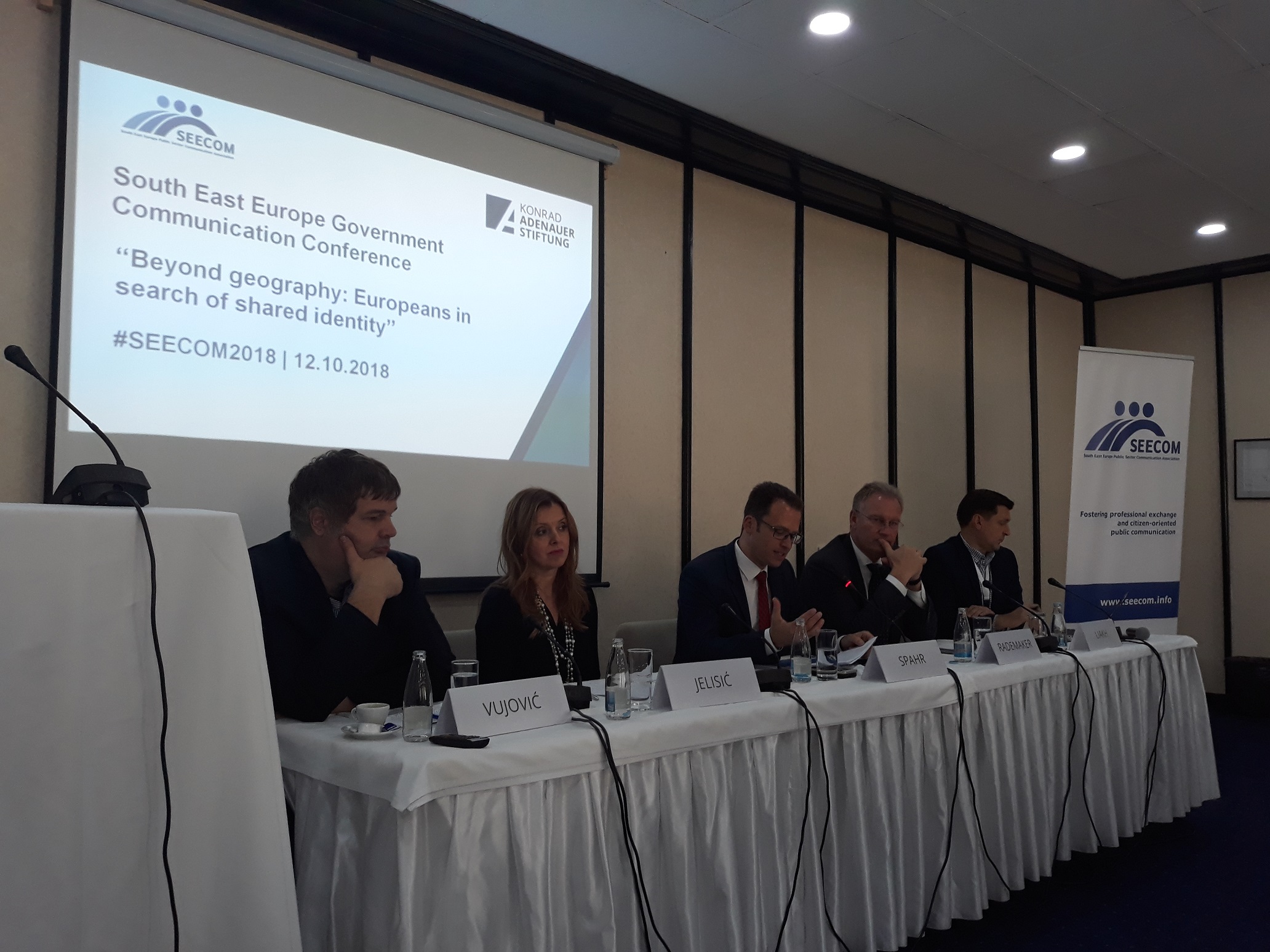The 7th annual South East Europe Government Communication Conference entitled “Beyond geography: Europeans in search of shared identity”, took place in Sarajevo, Bosnia and Herzegovina, on 12 October 2018.
The participants in the conference, senior public sector communication officials from South East Europe, EU officials and some of Europe’s leading public sector communicators and communication experts, discussed the challenges, opportunities and ways forward in building a stronger shared European identity and communicating the idea of a united Europe.
The event was co-hosted by the South East Europe Public Sector Communication Association (SEECOM) and the Konrad-Adenauer-Stiftung Media Program South East Europe.
The key discussion points are found in the Conclusions below.
CONCLUSIONS
Challenges
The concurrent crises affecting the EU are feeding populist and extremist political movements across the continent, which are challenging the very idea of a united Europe. As a result, important political voices within the European Union are calling for internal reforms and consolidation before any further enlargement of the Union can be considered. In addition, in many countries, EU bashing is a regular practice across the political spectrum.
On the other hand, the increasingly complicated geopolitical context in South East Europe and the ever more complex communications environment, including cyber-security threats, disinformation and propaganda campaigns and the deterioration in media standards, are making it very difficult for the governments of the enlargement countries to communicate about European integration.
A vast majority of EU Member States are hardly investing any effort to communicate to their citizens the importance and benefits of EU enlargement, even if the policy itself involves spending billions of Euro of European taxpayers’ money.
The European Union is facing a crisis of credibility, as European citizens in both – the EU and the enlargement countries – are largely disinterested and disengaged when it comes to EU affairs. As for the media, the EU-related topics are perceived as boring news that has no potential of getting the audience’s interest or are seen as issues that concern only the governments and Brussels elites and serve their PR interests.
Communication capacities of Western Balkan governments are generally quite week, as many government communication offices are understaffed and in need for training and professional development. This hinders the capability of Western Balkan governments to capture the interest of their citizens and get them engaged in the EU integration affairs.
Opportunities
The Bulgarian Presidency of the EU Council put the Western Balkans back on the EU agenda as a major policy topic by hosting the first EU-Western Balkans summit after 15 years.
Furthermore, Austria retained the EU perspective of the Western Balkans among the key priorities of its EU Presidency, while the next EU Presidency, Romania, also announces to keep EU enlargement high on the agenda. Even if not all EU Member States are equally enthusiastic about the prospect of enlarging the EU to the Western Balkans, generally speaking the focus on the Western Balkans has never been greater.
Third-party geopolitical interests and ambitions in the Western Balkans have raised awareness throughout Europe of the risks of contesting narratives and values finding fertile ground in the EU’s most immediate neighbourhood.
The migration crisis and the constructive role played by the Western Balkan countries has shed more light on the region’s strategic relevance for the EU. Contributing to the EU Member States’ efforts to resolve this major humanitarian and political issue could help improve public perception of the Western Balkans within the EU.
Ways Forward
There is a story in every project and every policy. Therefore, institutions in the Western Balkans should work to inspire greater public interest in and support for EU integration, by producing easy to understand and engaging stories. It is unreasonable to expect the media to discover interesting stories in thousands of pages of complex policy and project documents. Therefore, it is the job of government communicators to produce such ‘positive stories’ and make them available to the media.
The Western Balkan governments need to build capacities to communicate in a credible and effective way. To this end, professional exchange among communicators is invaluable.
Public participation is a powerful tool against scepticism. Citizens may not be interested in hearing about public policies, but they are much more likely to get engaged if they have a say in how policies are designed and implemented. In addition, public participation informs decision-making and helps governments to create policies that are better tailored to citizens’ actual needs, expectations and concerns.
In order to demonstrate the region’s relevance and value for EU citizens, new messages are needed on what enlargement countries have to offer to Europe. However, all communication efforts need to be driven by policy actions, as actions speak louder than words.
The EU and its institutions can provide the Member States and the candidate countries with the tools and coordination mechanisms for more effective and more synchronized communications, but nothing can replace the efforts of national governments to communicate with local audiences. The approach should be bottom-up. Initiatives, audience insight and local expertise should come from national governments and Brussels should provide the support and tools to facilitate synergies.
Engaging young people is vital for sustaining popular support for a united Europe. To this end, investments in media literacy and civic education are critical in building young people’s capacity for critical thinking and resilience to disinformation. Formal education is highly important for inspiring the sense of shared European identity and instilling the idea of a united Europe, as an unprecedented project of spreading peace and prosperity on the whole European continent.

